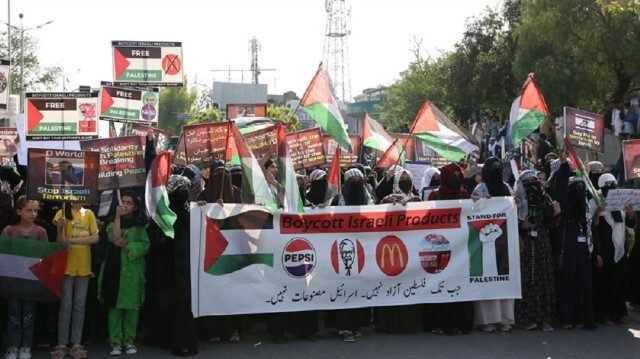
"Before ordering (for wedding ceremonies) people are clearly telling; no foreign brands of beverages and ice cream," Mohammad Kafeel, a Karachi-based caterer told Anadolu
Wamiq Haris was overseeing a waiter at his small restaurant in the eastern district of Pakistan's commercial capital, Karachi, who was placing soda and water bottles in a fridge.
It was a typical restaurant atmosphere. But one thing was clearly missing: Western brands, mainly beverages.
Despite a year after the Israeli attacks on the Gaza Strip that killed more than 41,000 people, mostly women and children, a boycott of foreign brands, particularly from pro-Tel Aviv countries, is palpable across the South Asian nuclear country.The boycott campaign is not official, although Pakistan outrightly opposes Israeli occupation.
"Customers are still demanding local brands, which has drastically reduced the consumption of Western products, particularly beverages and desserts over the past one year," Haris told Anadolu.
"For the last several months, we have been ordering a limited stock of international brands of soda and ice cream due to a scanty demand," he added.
The significant drop in sales of foreign beverages is a microcosm of a socially-driven movement to boycott US- and Europe-linked products in Pakistan amid the onslaught in Gaza.
"We thought the boycott, in line with similar campaigns in the past, would continue for a few months, but let me admit, I was wrong. It's the same: people (still) tend to boycott," said Haris.
From traditional caterers to fast food restaurants, and bar associations to social clubs, the boycott movement has left its footprint.
Footfall for customers at American fast food chains KFC and McDonald's has also dried up in recent months, forcing restaurants to reduce operations across the country.
The plunging sales forced the closure a few months ago of one of the first foreign fast-food branches in Karachi that was launched in the 1990s.
The High Court Bar Association of southern Sindh province, which banned sales of branded beverages and water within the court's premises last November, has stuck to its guns.
Many organizations, including the Karachi Bar Association and media clubs also followed suit, although foreign brands, mainly soda and water, are still available.
"Before ordering (for wedding ceremonies) people are clearly telling; no foreign brands of beverages and ice cream," Mohammad Kafeel, a Karachi-based caterer told Anadolu.
Months ago, a video went viral on social media that showed a young man sporting "keffiyeh," a black-and-white checkered scarf that is a symbol of the Palestinian liberation movement, at his engagement ceremony in Karachi.
Other videos showed Pakistanis, including women and children, carrying Palestinian flags and protesting regularly at KFC and McDonald's restaurants across the country.
- Local brands fill gap
The boycotts have boosted prospects for native alternatives as several brands are vying to fill the gap, with some seeing a surprise surge in sales.
Cola Next is a local soda brand that has ostensibly replaced global beverage brands in recent months with a “manifold” surge in sales, according to a spokesperson, who refused to give exact figures.
Kababjis, a local fast-food chain is another example of a roaring business in the wake of the boycott. The chain has introduced its own brand KFC, or Kababjis Fried Chicken, which dealt a blow to the sales of the original KFC, which runs 128 restaurants in 37 cities in Pakistan.
- Quality issues
Taking advantage of the boycott, the local companies, although, significantly increased their sales and profits, however, many failed to compete with foreign products in terms of quality and sustainable market strategy.
In September, on the overall level, those who agreed with a boycott were 68%, slightly higher than the 65% recorded in April, according to Kashif Hafeez, head of Pulse Consultant, a Karachi-based think tank that has monitored the boycott campaign since last October.
Compared to the first wave of tracking in November 2023, however, there is a sharp decline of almost 15% -- 85% to 70%.
"After Ramadan, we observed a significant increase of 16% amongst agreed to boycott (from 68% in December 2023 to 84% in April 2024) in practical impact," added Hafeez.
But in the September wave, the practical effect dropped 10%, declining from 84% to 74%.
Boycott sentiments were more entrenched in children and upper socio-economic classes, he added.
The number of those who practically participated in the boycott of US and other pro-Israel countries' products has declined, however, due to a string of reasons ranging from low-quality to sustainable supplies and a lack of brand-building by local companies, according to Hafeez.
"It's (decline) is not because of the break in sentiments but because local companies have failed to provide quality products, aside from incompatible prices, unsustainable supplies and less attention towards brand-building," he said.
He said, unfortunately, local brands used the opportunity to increase profits on the back of public sentiments instead of building their brands and improving quality.
"I want to cite an example of a local soft drink brand that managed to snatch a sizable market share due to the boycott of international brands but it did not even provide its own chillers to the sellers. They even relied on the chillers of rival foreign brands to sell their products," he said.
It compelled many to switch back to foreign brands, said Hafeez.
Nevertheless, he added, a large number of customers still stick to the boycott campaign.













